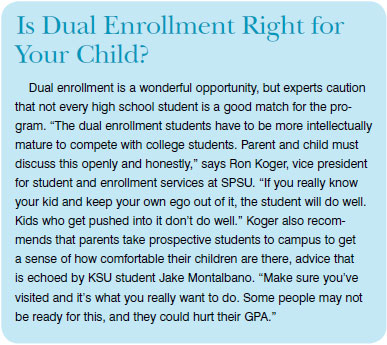
Dual enrollment—which lets high school students take state-funded college-level courses—has been one of Cobb County’s best-kept education secrets for decades. Not anymore, says Dr. Katherine Kinnick, director of the Dual Enrollment Honors Program (DEHP) and professor of communication at Kennesaw State University (KSU). “The word is finally getting out what a wonderful opportunity this is. Students get a great head start on college and parents save a lot of money,” she says.
The reasons high school students enroll in college courses are as varied as the students themselves, but one phrase comes up again and again. “For many students, it’s really the best of both worlds,” says Stacey Solomon, academic advisor at KSU. “Taking college courses in high school lets dual enrollment students sample college life without missing out on the high school prom, football or marching band.”
The cost of higher education is another factor. “Taking 50 percent KSU courses his junior and senior year will allow my son to graduate high school with a full year of college credits,” says Kim Montalbano, a dual enrollment parent and local educator. “That’s going to save us at least $20,000 if he goes away and lives on campus.”
The recent passage of HB131, which goes into effect July 1, establishes the right of high school students taking one or more courses at qualified institutions to have those courses treated in the same fashion as high school Advanced Placement (AP) and International Baccalaureate (IB) courses to calculate HOPE scholarship status. This new legislation is poised to change the education landscape for students, parents and teachers all across the county.
A New Definition of Dual Credit
In the past, some students received less credit for their college courses than they would for the AP and IB courses available in their high schools, which proved to be a disadvantage when their GPA was calculated. “Until now, some students didn’t enroll in certain classes because their high school Advanced Placement class would get more weight in GPA calculation than a college course,” explains Solomon. “Different high schools have rules that vary from campus to campus.” Montalbano, for one, applauds the new legislation. “Last year, it did hurt [my son’s] GPA a little bit. But now [he] will get that extra quality point for his KSU classes,” she says. She also points out that the cost of AP classes is covered by parents, but dual enrollment is state-funded.
Comprehensive Funding
Solomon says that at KSU, state funding guarantees paid tuition for qualified students in the university’s DEHP. “At KSU, no one is turned away for lack of funding. If you meet the criteria, you will be accepted,” she says.
The majority of dual enrollment funding in Cobb County comes from two major programs, ACCEL and Move on When Ready (MOWR). “If a student does ACCEL, they can attend part-time at Chattahoochee and part-time at the high school. This is our most popular program,” says Aisha Willis, student affairs coordinator at Chattahoochee Technical College. “One hundred percent of tuition is paid, and students are responsible for fees and books. For Move on When Ready, they must attend Chattahoochee full-time. One hundred percent of tuition and fees are paid, and students are responsible for their books.”
A Taste of Higher Education
While Cobb County is known for excellent high schools, dual enrollment gives highly motivated students a head start on their college experience. Through dual enrollment, these students can actually graduate high school with their core curriculum partially or entirely complete. “Taking advantage of dual enrollment not only gave me a head start, it also gave me a ‘sneak peek’ at college life,” says Jake Montalbano, who began taking classes at KSU during his junior year at Lassiter High. “You get insight into what college life is like and what you want to do.” Dr. Zvi Szafran, vice president for academic affairs at Southern Polytechnic State University (SPSU) agrees this is a huge benefit. “Dual enrollment also lets them sample campus life and test out the major they are considering,” he says. “Sometimes what they learn is, ‘Maybe I should consider something other than engineering.’”
For Kate Rascoe, who divided her senior year between King’s Academy and KSU, taking courses in composition and public speaking opened her eyes to new possibilities. “I was considering law—in fact, I still am—but taking courses at KSU made me believe I can be a writer,” she says. During her year at KSU, Rascoe was awarded an honorable mention in an emerging writers contest, competing against traditional undergraduates as well as dual enrollment students. But she hastens to add that enjoying senior year was also a priority for her. “I wanted to have the nostalgia of senior year, where I was captain of the soccer team and loved my high school.”
Another attraction for many students is the ability to take subjects that are not available at their high school. “Some high schools have had to cut back on language courses, so that is an especially popular choice. Many students come here to take Chinese,” says Kinnick.
Acclimating to Campus Life
Schools are mindful that dual enrollment students need services to acclimate to the college environment. Kinnick says that KSU has responded to the rise in dual enrollment with more student support. “We brought Stacey Solomon on board as an academic advisor dedicated full-time to students in the DEHP. KSU is unique in that we are the only institution in the state of Georgia—other than residential academies—that lets high school students take honors courses without living on campus.” She notes that the majority of DEHP students are commuters who are also able to enjoy small classes that might otherwise be unavailable to freshman.
The additional support has eased the transition for many families. “The KSU dual enrollment program does an outstanding job communicating and helping parents navigate the system of approval, credit and funding,” says Kim Montalbano. Additional resources include an in-depth orientation and tour at the beginning of the school year.
Attracting the Best and the Brightest
Colleges know that dual enrollment puts them in an excellent position to attract the most mature and motivated students. “We hope that the dual enrollment students will enroll at Poly when they graduate high school,” says Szafran. “This program shortens the path to a degree, so they can graduate more efficiently and economically.”
 Willis agrees that bringing qualified high school students onto campus is beneficial for all parties. “Chattahoochee Technical College is an access point for students of all ages. We offer a low cost, high quality, close-to-home option. We have eight campuses, many different programs of study and students can choose from day, evening or online courses,” she says.
Willis agrees that bringing qualified high school students onto campus is beneficial for all parties. “Chattahoochee Technical College is an access point for students of all ages. We offer a low cost, high quality, close-to-home option. We have eight campuses, many different programs of study and students can choose from day, evening or online courses,” she says.
Incentive programs like dual enrollment inevitably attract the brightest and the best students. Because KSU is the only honors dual enrollment program in Cobb County, Kinnick believes the university is in an ideal position to attract quality students. “Launching an honors college is part of our strategic plan. About one third of dual enrollment students re-admit at KSU, and they are much more likely to continue as grad students at KSU,” she says. Solomon concurs. “KSU dual enrollment students are the cream of the crop. We’ve had dual enrollment students accepted not only at Georgia’s best schools but also at Alabama with huge scholarships,” although she notes that many students elect to stay at KSU. “We know the caliber of student in DEHP, and it’s valuable to have them here even if they go on to other schools,” Kinnick adds.
Rascoe, who is headed to UGA, agrees heartily. “Even though I’m excited about UGA, I’m kind of sad to leave Kennesaw State,” she says. “I got lots of confidence there and had such great classes.”
————————
Is Dual Enrollment Right for Your Child?
Dual enrollment is a wonderful opportunity, but experts caution that not every high school student is a good match for the program. “The dual enrollment students have to be more intellectually mature to compete with college students. Parent and child must discuss this openly and honestly,” says Ron Koger, vice president for student and enrollment services at SPSU. “If you really know your kid and keep your own ego out of it, the student will do well. Kids who get pushed into it don’t do well.” Koger also recommends that parents take prospective students to campus to get a sense of how comfortable their children are there, advice that is echoed by KSU student Jake Montalbano. “Make sure you’ve visited and it’s what you really want to do. Some people may not be ready for this, and they could hurt their GPA.”

















